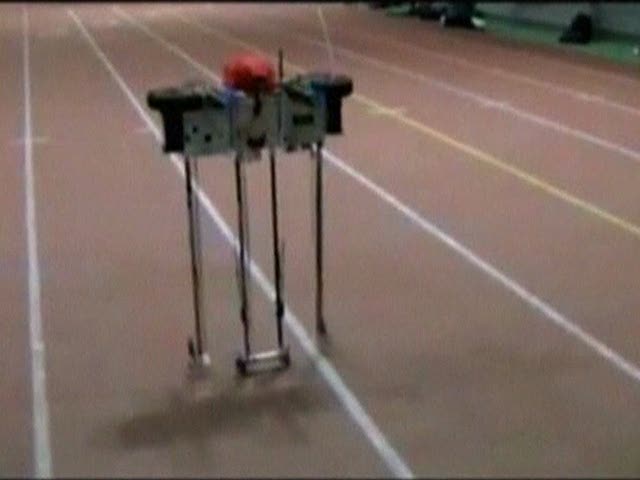Two more former secret police in the Baltic states have been found guilty of Stalinist-era crimes against humanity and sentenced to prison.
Published:
20 July 2000 y., Thursday
An 86-year-old former officer in Stalin's secret police, Yevgeny Savenko, was found guilty by a Latvian court on July 7 and sentenced to two years in prison for participating in the arrest and deportation of scores of Latvians after the country was occupied by Soviet forces in 1940.
Prosecutors say Savenko signed orders for the arrest of some 50 people, including policemen, Latvian officers and even several high-school students. Many were eventually executed or died in prison.
In Estonia, Karl-Leonhard Paulov, 76, was convicted on June 29 and given an eight year prison sentence for murdering three Estonians hiding in the forest from Soviet authorities in the 1940s. Last year, he was convicted on similar charges. But a court later ordered that his case be heard again.
Tens of thousands of people took refuge in Baltic forests in the years after the Soviet takeover in 1940. Many sought to avoid deportation to Siberia, while others took up arms to actively resist the Soviet occupation.
As a young agent, Paulov was ordered into the forest to gain the confidence of forest refugees, then to capture or kill them. Prosecutors said he ended up shooting two of the men mentioned in the indictment in the back. Paulov told the court he'd acted in self-defense.
After they regained independence, all three Baltic states pledged to indict and convict those responsible for Stalinist-era atrocities. Half a dozen men have been convicted in the Baltic states for Stalinist-era crimes, and half a dozen other cases are expected to go to court in the coming weeks and months.
Šaltinis:
Copying, publishing, announcing any information from the News.lt portal without written permission of News.lt editorial office is prohibited.
The most popular articles

The European Commission announced today the award of three of the six contracts for the procurement of Galileo’s initial operational capability.
more »
 In a world first, doctors in Austria have amputated the arms of two young men and replaced them with bionic prosthetics. The decision to amputate was made after the men had irreversibly lost all movement in their hands.
more »
In a world first, doctors in Austria have amputated the arms of two young men and replaced them with bionic prosthetics. The decision to amputate was made after the men had irreversibly lost all movement in their hands.
more »
 An ultra-realistic robot, known as a geminoid, is helping psychologists test how we relate to machines...
more »
An ultra-realistic robot, known as a geminoid, is helping psychologists test how we relate to machines...
more »
 Scientists from the University of Sheffield have developed pigment-free, intensely coloured polymer materials, which could provide new, anti-counterfeit devices on passports or banknotes due to their difficulty to copy.
more »
Scientists from the University of Sheffield have developed pigment-free, intensely coloured polymer materials, which could provide new, anti-counterfeit devices on passports or banknotes due to their difficulty to copy.
more »
 iRobot Corp announced plans to create Android applications for the iRobot Ava mobile robotics platform.
more »
iRobot Corp announced plans to create Android applications for the iRobot Ava mobile robotics platform.
more »
 When robots talk to each other, they're not generally using language as we think of it, with words to communicate both concrete and abstract concepts.
more »
When robots talk to each other, they're not generally using language as we think of it, with words to communicate both concrete and abstract concepts.
more »
 Using laser and nanotechnology, scientists in Chicago have been able go back in time and uncover how masterpieces from artists like Homer and Van Gogh might have looked like when they were first painted.
more »
Using laser and nanotechnology, scientists in Chicago have been able go back in time and uncover how masterpieces from artists like Homer and Van Gogh might have looked like when they were first painted.
more »
 Most mechanical resonators damp (slow down) in a well-understood linear manner, but ground-breaking work by Prof. A. Bachtold and his research group at the Catalan Institute of Nanotechnology has shown that resonators formed from nanoscale graphene and carbon nanotubes exhibit nonlinear damping, opening up exciting possibilities for super-sensitive detectors of force or mass.
more »
Most mechanical resonators damp (slow down) in a well-understood linear manner, but ground-breaking work by Prof. A. Bachtold and his research group at the Catalan Institute of Nanotechnology has shown that resonators formed from nanoscale graphene and carbon nanotubes exhibit nonlinear damping, opening up exciting possibilities for super-sensitive detectors of force or mass.
more »
 Automated driving systems, such as adaptive cruise control, may be the latest "must have" gizmos but the auto industry is already looking to their successor - cooperative driving - where cars communicate with each other as they go.
more »
Automated driving systems, such as adaptive cruise control, may be the latest "must have" gizmos but the auto industry is already looking to their successor - cooperative driving - where cars communicate with each other as they go.
more »
 For the past few years, researchers have been using quantum dots to increase the light absorption and overall efficiency of solar cells.
more »
For the past few years, researchers have been using quantum dots to increase the light absorption and overall efficiency of solar cells.
more »
 'Ranger' the robot has set a world record for its developers at Cornell University, by walking 40.5 miles non-stop on one charge.
more »
'Ranger' the robot has set a world record for its developers at Cornell University, by walking 40.5 miles non-stop on one charge.
more »